Cave of Consciousness
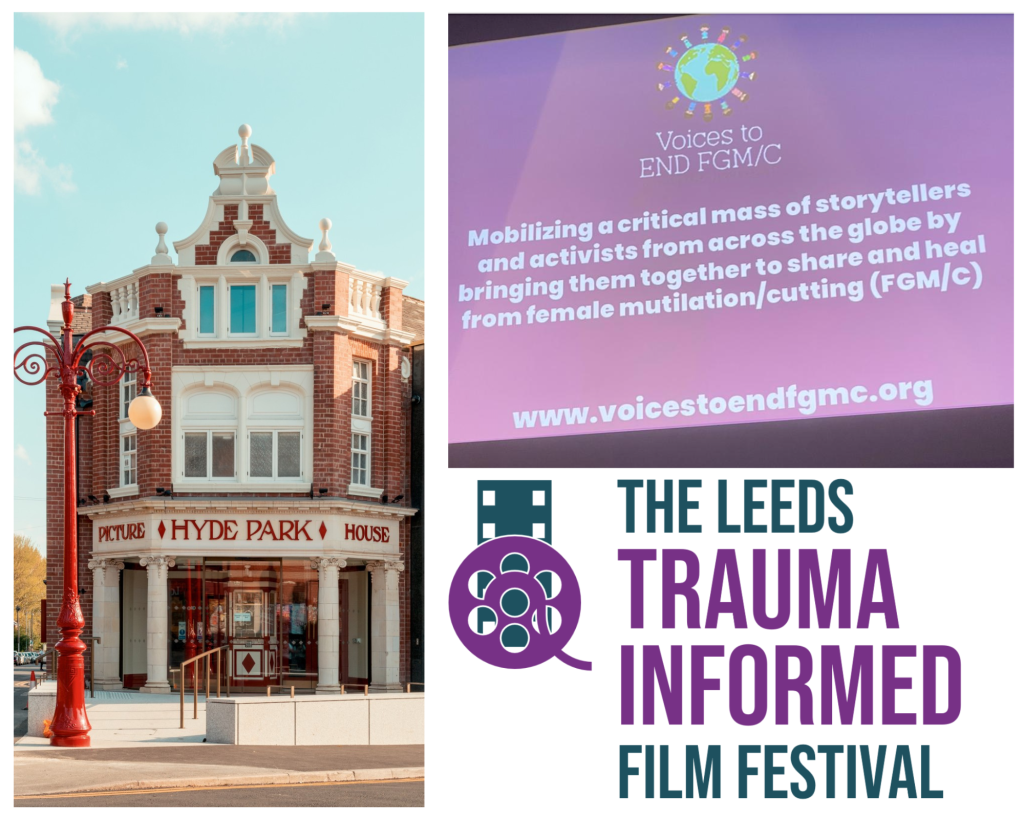
Recently Sahiyo’s Editorial Assistant Megan Seaver sat down with 2022 Voices to End FGM/C Alum Ibtisam to discuss the screening of her Voices digital story at the 2024 Trauma-Informed Film Festival, Leeds, UK. Voices to End FGM/C is a collabortive project between Sahiyo and Silence Speaks mobilizing a critical mass of storytellers and activists from across the globe by bringing people together to share and heal from their experiences of female genital mutilation/cutting (FGM/C), connect and grow as leaders in their communities, and create short videos calling for an end to this harmful practice. Below Ibtisam speaks about her experience at the screening, and how sharing her story has opened her up to new forms of activism and change. 1. Why did you feel compelled to submit your digital story to this film festival? I felt my piece was a perfect match with the festival’s theme because it is about a trauma that I went through. But most importantly, I wanted to submit my video to this festival because FGM/C is just something that’s not on people’s radar. There’s very little awareness, and so I wanted to shine a light on the issue by submitting my film. 2. How was your experience at the screening and what was it like sharing your story in that format? It felt really surreal. I’m a big film buff, so to see my own film to be projected in the cinema hall – I just don’t have words for it. Also, to see what I had shot on my little iPhone in the Ingleborough caves – to be put up on a huge screen with all the other films – was amazing. To be sitting in the audience with no one else knowing that it was my film up there, but I could hear people’s response, like the gasps, It felt larger than life. It also brought back memories of when I made the film. I felt that I had gotten some distance from it over the years. Suddenly, it felt up close and big, reminding me of the impact that the experience had on me. Seeing it in the big dark cinema hall made the impact of the film even greater for me. 3. What was the reaction to your story at the screening? Well, I didn’t know anyone in the audience, I don’t have a specific memory of people’s reactions. What I do remember is that after everyone’s films were shown, they called us up on stage and I remember I did not want to go up as I was quite shy. But there was another participant, a transgender man who had shared his film, who was very confident and he said, “What, I am going up alone? No one is with me?” and immediately after he said that I thought to myself, “Ok, I’m just going to do it. I’m going up there.” And then all of us followed him up onto the stage together! All of us standing up there, it made me feel like we were healing our trauma collectively. That it does not have to be one person’s voice, but many who stand together against trauma. 4. How was the process of submitting your digital story to this festival? Would you recommend it to other Voices alumni? I think if people are comfortable with it, and if the opportunity comes, trust your gut and take it. I think I did a bit of both, I didn’t overthink it, but at the same time I was mindful of what I was getting myself into. I was also showing my film in a setting that spoke about trauma and the audience understood that. We were in a curated safe place, so I would just say to anyone wanting to do this —just make sure you’re sharing in a safe space. Sharing my story at the film festival gave me the courage to speak out about FGM/C more in my life. I always say that courage needs encouragement. In order to be open about this, we need support. 5. What do you hope people learn from your story? First of all, I hope my story provides more awareness around FGM/C, because for most people it’s not even known. Also, my story will be included in the film festivals program at other screenings, so it’s going to reach even more people hopefully and it will take on its own life and journey. When I made this short film two and half years ago, I never would have thought that something like this would happen. The whole process of creating this film was amazing as well. In a lot of ways, I feel that the caves called to me and that I was meant to include them in my story. I just can’t believe the ways in which this story has come to life. When I was first submitting this project, I was asked whether or not I wanted to include my name, and I decided that I was ready for that – I was ready to own my story. 6. Is there anything else you would like to add? I just wanted to say that all of this is a part of the journey. In any movement you may feel that there are times when you have “done your bit”, and then you take a backseat, but there will come a time when something else pushes you to be more involved. I also want to congratulate the founders of Sahiyo, as they continue to do this work and the advocates and activists, who are doing this work in different ways. I also want to highlight how this experience has changed my perspective on my story. Before submitting it to the film festival I had a lot of time away from the video. I hadn’t watched it since the release, so seeing the film again made me realize that for myself, some parts of me had been healed, others had been revealed,
Uniting to End FGM/C Across the Americas: A Joint Statement

This February 6th – International Day of Zero Tolerance for Female Genital Mutilation/Cutting, in recognition of this year’s theme – “Stepping Up the Pace. Strengthening Alliances and Building Movements to End FGM,” we are delighted to announce the formation of the Americas Alliance to End FGM/C. The Americas Alliance will serve as a coalition of organizations, governments, researchers, activists, and survivor advocacy groups, dedicated to ending female genital mutilation/cutting (FGM/C) across the Americas. Recognizing FGM/C as a severe violation of human rights and a form of gender-based violence (GBV), the Alliance aims to unify efforts to support survivors, enhance prevention strategies, and promote gender equality throughout the region. FGM/C impacts communities worldwide, including across North and South America, though misconceptions lead to falsely believing the Americas are immune from this form of gender-based violence. The latest data shows us that there may be over 700,000 women and girls across the United States and Canada affected by or at risk of FGM/C. FGM/C also continues to be reported in Colombia, where a bill has recently been introduced to combat the harmful practice. There is also historical evidence of FGM/C being practiced in Mexico, Brazil and Peru which requires further investigation to determine current practice. From survivors living with its physical and psychological consequences to girls at risk, FGM/C transcends borders and cultures, demanding a unified, coordinated, and survivor-centered response.1 Recognizing this need, we are proud to support the creation of the Americas Alliance —a collaborative network dedicated to addressing FGM/C through cross-border cooperation, shared knowledge and resources, and survivor-informed approaches. By bringing diverse voices and expertise together, the Americas Alliance aims to build capacity, amplify advocacy, and create lasting change. Participants: The founding organizations of the Americas Alliance include The U.S. End FGM/C Network, the End FGM Canada Network, George Washington University, Equality Now, and Sahiyo U.S. The Americas Alliance will also involve additional diverse groups of stakeholders dedicated to ending FGM/C and supporting survivors across the Americas. The partners whom the Alliance will collaborate and engage with will include: Service-providing organizationsExamples: Grassroots NGOs, community health organizations, and social service providers working directly with FGM/C survivors. Government representativesExamples: Government and intergovernmental development agencies and departments. ResearchersExamples: Academic institutions, public health researchers, gender studies scholars, and independent experts focused on FGM/C. ActivistsExamples: Survivor-led advocacy groups, grassroots organizers, human rights defenders, and gender justice advocates. And moreExamples: International organizations, private sector partners, legal advocates, faith-based organizations. Our Shared Commitment As participants of the Americas Alliance, we are dedicated to: Enhance data collection and knowledge sharing by establishing a robust framework for collecting and sharing data across countries, improving the accuracy of FGM/C prevalence estimates, and understanding its impact throughout the Americas. Develop trauma-informed, culturally sensitive support systems by facilitating the creation of transnational support networks that are responsive to the cultural and holistic health needs of survivors. Strengthen prevention strategies and policy frameworks by promoting the exchange of best practices and successful prevention models from diverse contexts within the Americas. Coordinate consistent, survivor-centered communications by ensuring that messaging and communications around FGM/C align across the region, maintaining accuracy, and respect for the lived experiences of survivors. If you wish to learn more about the Americas Alliance to End FGM/C, please contact us at americasalliance@endfgmnetwork.org. 1 Efforts are aligned with key Sustainable Development Goals (SDGs), including SDG 3 (Good Health and Well-being), SDG 5 (Gender Equality), and SDG 17 (Global Partnerships).
Learning the complicated history of passing FGM/C legislation in Maine
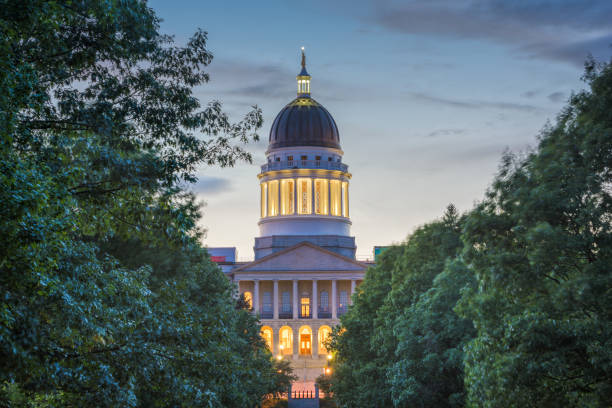
By Sophia Lynn Jones As a Maine resident, I was surprised to learn that my state is one of nine left in the U.S. without any laws protecting children from female genital mutilation/cutting (FGM/C). Upon doing more research, I discovered Maine’s complicated history of attempting to pass anti-FGM/C legislation, as well as the intersectional issues surrounding the two bills and one ballot initiative, on FGM/C that had been introduced in the state. Both bills had bipartisan support, however, after the bills were introduced to the State Senate and House floors, the issue of passing the legislation addressing FGM/C became highly partisan. A large point of contention was whether there should be criminal consequences for any parent or guardian who knowingly consents to a minor undergoing FGM/C. Timeline of Proposed Legislation: Bills 2017- LD 745, and HP 525, were introduced in 2017. Both laws would have made it a Class B crime to, (a) perform FGM/C on a minor “for nonmedical purposes,” (b) for a parent or guardian to consent or permit FGM/C to be performed, and (c) for a parent or guardian to remove the minor from the state for the procedure. Despite a Senator attempting to bring an amendment to the floor that removed the language making it a crime to consent to the procedure, the bill did not pass by one vote and later died between the House and Senate. Bills LD 1819, and HP 1261, were proposed in 2018 and sponsored by Representative Heather Sirocki & Cosponsored by Senator Mason. These bills would have made it a Class A crime to, (a) perform FGM/C on a minor, (b) knowingly transport a minor outside of the state for the procedure, and (c) knowingly consent to the procedure. The bill also called on the Department of Health and Human Services (DHHS) to develop a program that includes: community-based education, outreach and provision of support service to victims, training for mandated reporters, and distribution of educational materials about the health risks, emotional risks, and legal prohibitions/penalties of FGM/C. Although this bill passed in the Senate, it later died in the House. Another reason that led to the bill’s death, was that in 2018, emails were released that showed State Representative Heather Sirocki, was in contact with the national office and local chapter of ACT! For America, to garner support for an event she was hosting to promote her anti-FGM/C bill. ACT! For America, is an anti-Muslim hate group founded in 2007 that is known for promoting “anti-Sharia” legislation, pushing anti-Muslim conspiracy theories, and spreading fear of Islam within America. There were concerns that having ACT! For America presenting at an event promoting anti-FGM/C legislation would promote false stereotypes that FGM/C is connected to Islam, and target immigrant communities in Maine. A report by the American Immigration Council reported that in 2021, 3.8% of Maine’s population consisted of foreign-born individuals, and 1.4% of native-born Americans had at least one immigrant parent. Representative Sirocki denied reaching out to ACT! For America, claiming that the emails only show her responding to a request for information about the Bill. Sirocki also claimed to have anecdotal evidence that FGM/C was actively occurring in Maine. Then Governor Paul Lepage, stated during a press conference that the MaineCare health program paid out numerous claims for mutilation-related care, including treatment for children injured in Maine. The Maine DHHS refuted these claims stating that the treatments described were for conditions that wouldn’t likely be for children but rather for adult survivors of FGM/C. These controversies surrounding proposed FGM/C legislation in Maine and, overall, the intersectional nature of the issue of FGM/C, have made it challenging to move legislation forward. In addition to the two bills being introduced, a potential ballot initiative was introduced by petition to be included on a 2020 ballot that would have allowed citizens of Maine to vote on the issue, and if passed would have become a state statute. This approach was taken following the previous failed legislative initiatives, demonstrating the desire of citizens to pass this legislation. The 2020- Maine Crime of Female Genital Mutilation Ballot Initiative would have criminalized FGM/C being performed on a minor with a punishment of up to 30 years of incarceration and up to a $50,000 fine. However, the initiative did not even make it onto the ballot because the initial petition failed to gather enough signatures from Maine citizens to be considered by the ballot initiative deadline. Even with all these challenges, the initial bipartisan support that has been given to this issue in the past gives me hope that in time and with the right political climate, and with survivors pushing the way, Maine can eventually come up with agreed-upon language for a bill that addresses FGM/C holistically and comprehensively. One day, our state will join the 41 other U.S. states protecting girls and women from the harmful practice of FGM/C.
Legislative Briefing on FGM/C in the State of Connecticut: A Collaboration between the Connecticut Coalition
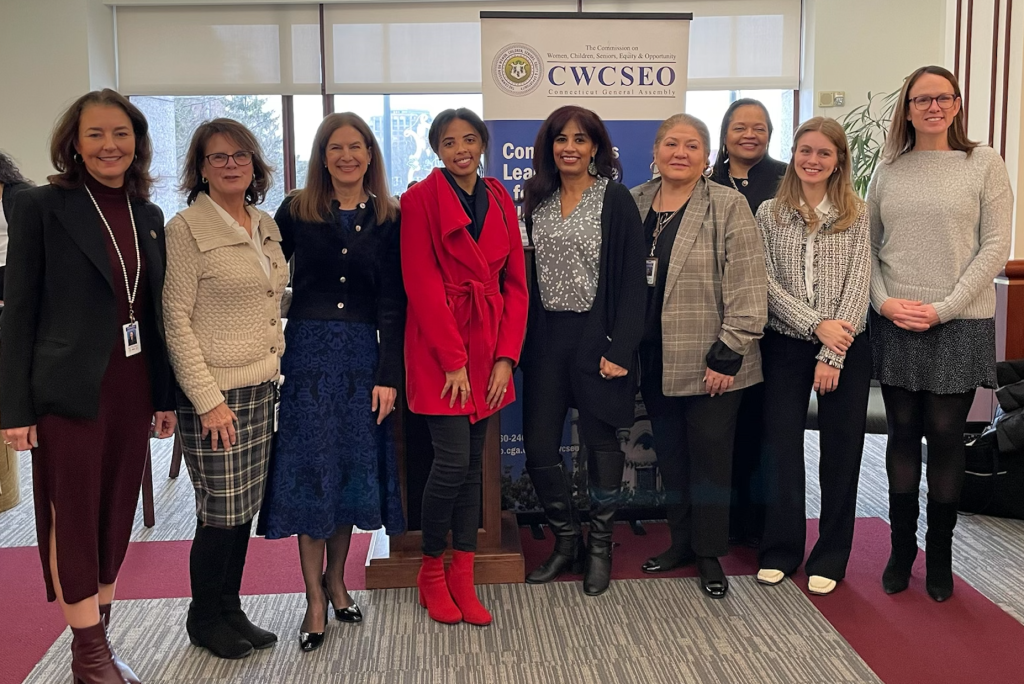
On January 13th, the Connecticut Coalition to End FGM/C hosted a legislative briefing at the Legislative Building in Hartford, CT. The briefing was held in partnership with Sahiyo, Equality Now, and the U.S. Network to End FGM/C. The briefing provided an opportunity to learn more about the topic of FGM/C and the need to pass a law protecting children from it. Speakers included: Lieutenant Governor Susan Bysiewicz Mariya Taher Representative Jillian Gilchrest Siminesh Comollo The speakers discussed the importance of increased awareness of FGM/C as an issue local to the state of Connecticut, and the need for a specific state law against FGM/C. The briefing was intentionally held at the start of Connecticut’s next legislative session in order to introduce and pass a comprehensive bill protecting children from FGM/C and to create resources to support survivors. The Lieutenant Governor and Connecticut Representatives highlighted that pressure and advocacy by local, national, and international actors would help to make passing legislation possible. (Mariya Taher, Sahiyo U.S. Executive Director, and Connecticut Lieutenant Governor Susan Bysiewicz)
Kicking off our Massachusetts Community Health & Healthy Aging Project to build a state-wide coalition addressing FGM/C
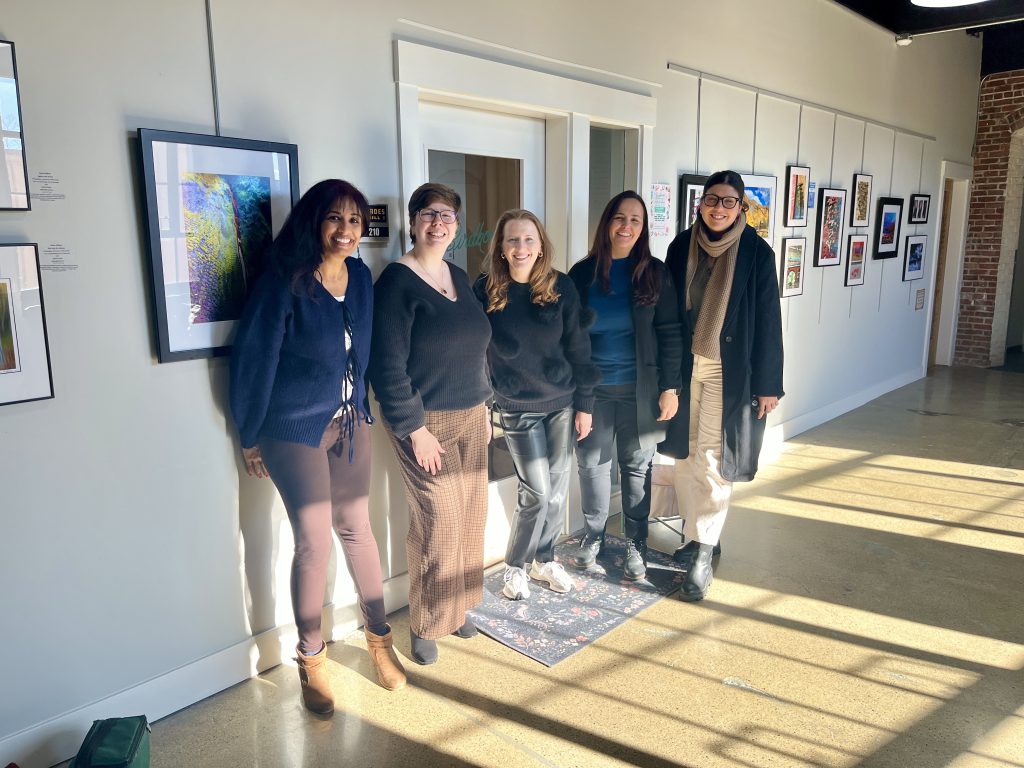
Last month, we hosted our first meeting for the Massachusetts Community Healthy and Healthy Aging project. The meeting, which took place at Birdhouse in Amesbury Massachusetts, marked the beginning of a collaboration between Sahiyo, The US End FGM/C Network, and UMass Chan Medical School, and was held to discuss project aims, goals, and timeline for the first year of project implementation. Through the funding provided by The Massachusetts Community Health and Healthy Aging project, our team will work towards building a comprehensive network of stakeholders and service providers who can implement a coordinated, systems-based approach to addressing FGM/C over the course of five years. Our goal is to improve health outcomes for survivors of FGM/C, with a special focus on survivors who are people of color. Additionally, we will work to prevent FGM/C among future generations by increasing resources to overcome obstacles we often face, such as lack of awareness among service providers regarding FGM/C. Along with our partner organizations we’re grateful to The Massachusetts Community Health and Healthy Aging Funds for their support of this critical issue. To learn more about this project, please visit: https://mahealthfunds.org/
Sustainable Development Goals: How the UNs Benchmarks Align with Sahiyo’s Mission to End Female Gential Cutting
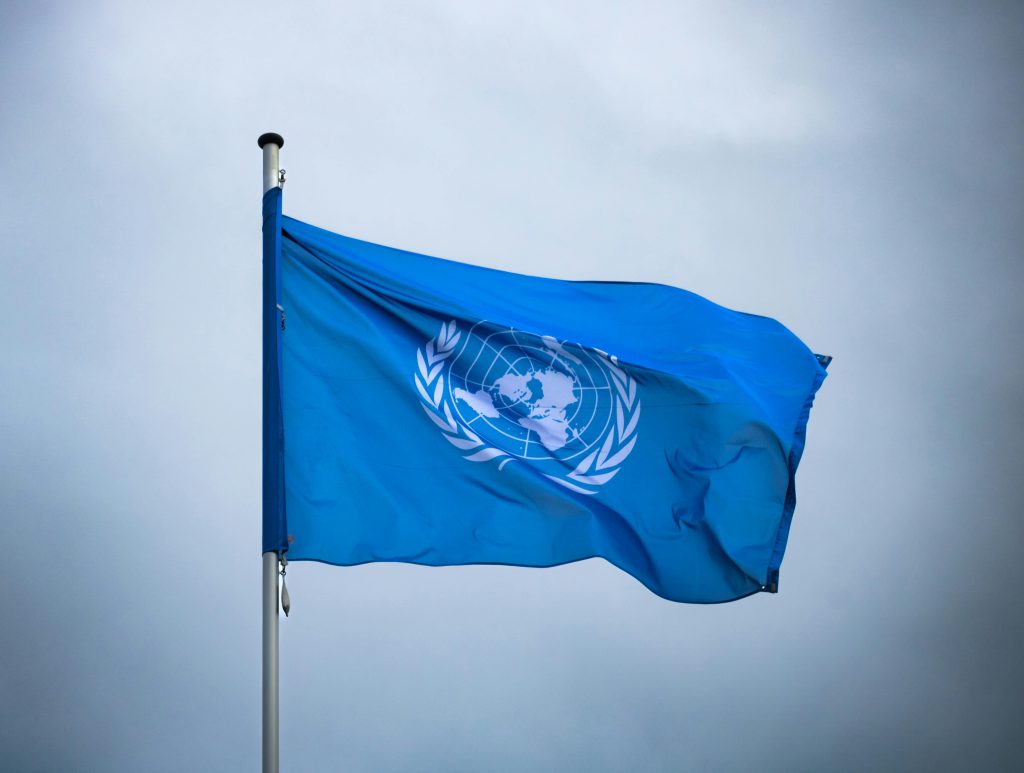
By Elaina Baliner Sahiyo’s Fundraising and Auction Intern Elaina Baliner is a recent graduate of The Ohio State University where she earned a Bachelor of Science in Health and Rehabilitation Sciences with a minor in Biology. A passionate global health equity advocate, Elaina actively seeks to maximize positive impact and close health equity gaps. Recently Elaina sat down with Sahiyo’s Editorial Assistant, Megan Seaver, to discuss the connection between Sahiyo’s mission to end FGC and the UN’s Sustainable Development Goals. What are the UN Sustainable Development Goals? The United Nations Sustainable Development Goals, (SDGs), are the 17 benchmarks set by the UN in order to achieve peace and prosperity for both people and the planet. These goals center on a One Health approach, meaning that the health of people, planet, and animals all intersect with each other. They are designed to break silos within the UN, addressing a longstanding issue of treating personal health, animal health, and planetary health as separate concerns rather than recognizing them as inherently interconnected. The SDGs are critical in guiding the global effort to push for a better world, addressing a range of interconnected challenges such as poverty, inequality, and environmental degradation. For Sahiyo, the goals that are most closely aligned to our mission of ending FGC are: SGD 3 Good Health and Well-being for All, and SDG 5 Gender Equality — specifically target 5.3 — which calls for the elimination of all harmful practices, including FGC. How do the goals of Good Health and Wellbeing for All, and Gender Equality, relate to Sahiyo’s mission? Sahiyo aligns with SDG 3, Good Health and Wellbeing for all, by advocating for the health rights of women and girls. FGC can lead to severe health complications such as chronic pain, infections, increased risk in child rearing complications, psychological trauma, and so much more. By raising awareness of FGC, Sahiyo also shines a light on the physical, mental, and social issues that the practice causes. Sahiyo also works closely with healthcare professionals to ensure that when survivors do seek care for complications related to FGC, the care they receive is culturally sensitive and wholly beneficial for the survivor. SDG 5, Gender Equality, is at the heart of Sahiyo’s work. The third target of SDG 5, also referred to as SDG 5.3, calls for the elimination of FGC. By providing resources and skills to communities affected by FGC, Sahiyo uplifts survivors’ voices, helping them to share their stories with the world and providing a space for narrative autonomy, which is crucial in promoting gender equality. Why do you think it’s important that Sahiyo ensure that its projects and programs connect to these goals outlined by the UN? Connecting our work to the UN goals situates FGC within a broader global context, highlighting that it is not merely a local or regional issue, but a critical matter of international concern. Additionally, aligning with the SDGs ensures that our projects are contributing to measurable, impactful change. The SDGs provide a framework for tracking progress and accountability, allowing us to demonstrate the effectiveness of our interventions in a globally recognized manner. Finally, by aligning with these goals, we can better advocate for the necessary support and resources to expand our impact, demonstrating that our efforts to end FGC and protect women and girls are part of the collective global movement toward a more equitable and healthier future for all. Do you think that the UN is doing enough to address FGC? The UN has made significant strides in addressing FGC through initiatives like the International Day of Zero Tolerance for FGM and the joint UNFPA-UNICEF program. While these efforts have been impactful, there is a pressing need for the UN to expand its scope and reach. The movement to end FGC must be a global one, requiring the UN to broaden its programs to include populations in Western countries and additional nations beyond the current focus on African and Middle Eastern countries in order to meet the 2030 goal of ending the practice. So, while the UN’s efforts have reached millions, leveraging their resources to expand this movement can drive even greater impact, ensuring no woman or girl is left behind in the fight against FGC. What are some programs and initiatives that Sahiyo has done that you think connect to these goals? One of the programs that has touched me the most is Sahiyo’s Voices to End FGM/C initiative. This initiative empowers survivors, particularly from underrepresented communities, to share their stories through digital narratives. Their bravery in speaking out, often against cultural expectations, helps break the silence around FGC, fostering empathy and creating the foundation for real social change. Moreover, Sahiyo’s focus on movement building is deeply aligned with both the SDGs and the UN’s joint program’s efforts to create a global movement against FGC. Through initiatives like our Activists Retreat, survivor-led policy coalitions, and technical training seminars, Sahiyo has found that as more people speak out and stimulate dialogue, we reach a threshold where change becomes more likely. By building this coalition of voices—survivors, advocates, and community members—we generate powerful momentum toward ending the practice. What are some ways that you would address these goals and Sahiyo’s mission? A significant way that Sahiyo could further address SDG 3 (Good Health and Well-being) is by expanding our healthcare provider training program into a comprehensive, adaptable curriculum suitable for both medical schools and continuing education for practicing healthcare professionals. On the research front, Sahiyo has conducted meaningful studies on prevalence, cultural intersections, and survivor narratives, addressing critical data gaps identified by the UN as obstacles to ending the practice. To build on this foundation, pursuing economic impact research would be a powerful next step, providing critical data to inform policy and advocacy. These initiatives are within Sahiyo’s reach and reflect our commitment to addressing SDG 3 and SDG 5. However, realizing them requires the support and resources that come from our community and donors. It is through collective action that we can continue to
Reflections on the Sahiyo Activist Retreat: A Transformative Experience
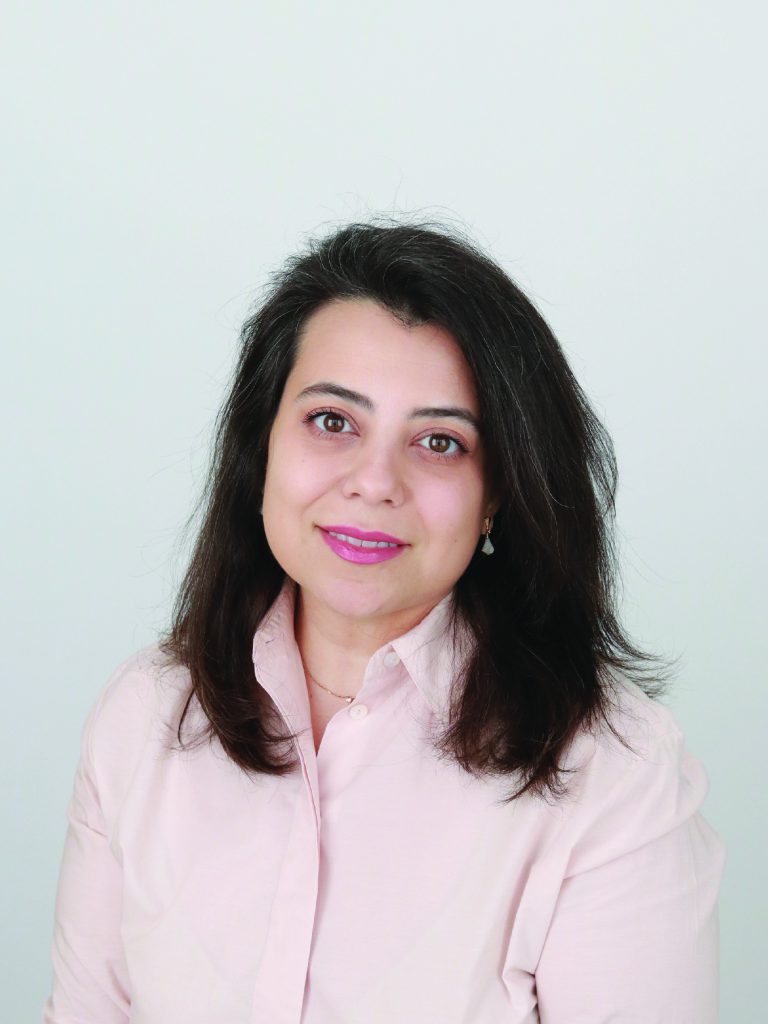
By Maryam Kamal Eldin When I first heard about the Sahiyo Activist Retreat, I knew I had to be a part of it. The retreat presented a unique opportunity for me to connect with others who shared the same commitment to ending female genital cutting (FGC) as I did. For years, I’d been passionate about advocating for survivors and raising awareness about this deeply rooted issue. My journey in this movement began in Egypt, where I worked alongside pioneering activists like Nawal El Saadawi, who fearlessly challenged the cultural and systemic roots of FGC. Being part of that movement shaped my understanding of the complexities surrounding this practice and inspired me to continue the fight on a global scale. As I’ve shifted my focus to the United States, I’ve realized that the movement here is still relatively small and in its early stages of growth, unlike in Egypt, where discussions about FGC have been ongoing for almost a century. This retreat felt like a pivotal moment for the movement against FGC in the U.S., as it brought together passionate individuals who are laying the foundation for a larger, more coordinated effort. A Space to Learn and Grow One of the most valuable aspects of the retreat was the sense of community it fostered. Meeting other activists from diverse backgrounds who are all working toward the same goal as me was incredibly inspiring. I was struck by how everyone brought their own unique perspectives and experiences, yet we all shared a common purpose: to create a world free from FGC. The workshops and discussions were particularly impactful. I learned about new strategies for community outreach, effective ways to engage with policymakers, and how to use storytelling as a powerful tool for change. I also appreciated the safe space created during the retreat, which allowed us to have honest and sometimes difficult conversations about cultural norms, challenges, and the complexities of addressing FGC within our different communities. The diversity of experiences shared during the retreat reminded me of the Egyptian women and their family members, many of whom shared harrowing stories of survival. Their resilience and courage continues to fuel my advocacy today, and it was heartening to see those same qualities reflected in the activists at the retreat. My Journey in the Movement My involvement in the movement to end FGC stems from a deeply personal place. Witnessing the impact of FGC on individuals and communities in Egypt and beyond has fueled my desire to be part of the solution. Working alongside Nawal El Saadawi taught me the importance of integrating education, advocacy, and storytelling to address this issue from all angles. In the U.S., the movement faces unique challenges. Many people are unaware that FGC even happens here, or they view it as a problem that exists only in other countries. Advocates often struggle to secure funding and attention for the issue, which makes it difficult to build momentum. This retreat, however, showed me that even though the movement in the U.S. is small, it is growing—and the commitment and passion of those involved give me hope for its future. Building on the Momentum The retreat has profoundly shaped how I view my role as an activist. It reminded me of the importance of self-care and collective support in sustaining this work. I left feeling more confident in my ability to navigate the challenges that come with advocacy and more determined than ever to push for change. Moving forward, I plan to incorporate what I’ve learned from the retreat into my ongoing projects. I am currently working on community workshops that address the intergenerational effects of FGC, and I hope to expand my efforts by collaborating with local schools and clinics to create safe spaces for survivors to share their experiences. The connections I made at the retreat will be instrumental in helping me achieve these goals. A Call to Action The Sahiyo Activists Retreat has been a transformative experience that I will carry with me for many years to come. It reminded me that while the road to ending FGC is challenging, we are not walking it alone. The movement to end FGC in the U.S. is still small, but it is growing—and it needs all of us to help it flourish. Sharing your story, educating your community, or supporting survivor-led efforts, every action makes a difference. Together, with shared knowledge, resources, and determination, we can create lasting change. If you’re considering attending a future retreat or getting involved in the movement, I encourage you to take that step. Whether you’re just beginning your journey or have been involved for years, there’s always something new to learn and ways to grow. To my fellow activists: thank you for your courage, your voices, and your unwavering commitment to this cause. Together, we are stronger.
The Washington Coalition to End Female Genital Mutilation/Cutting Interview Series: Amie Kujabi
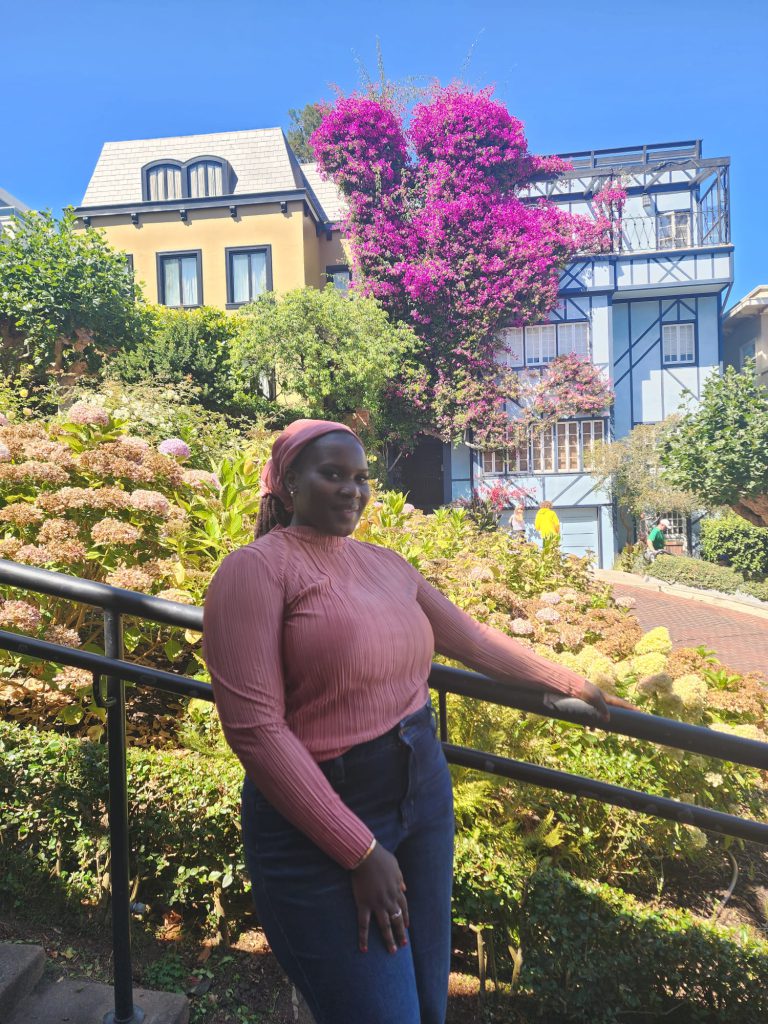
By: Sara Khattak Recently, policy interns at Sahiyo have been interviewing members of the Washington Coalition to End FGM/C to learn more about coalition member’s important work toward creating policy on female genital cutting (FGC). Sahiyo’s policy intern, Sara Khattak, talked to coalition member Amie Kujabi, a prominent advocate in the work to end FGC. Amie Kujabi, originally from The Gambia, has been involved in working to end violence against women since she was a teenager. Her personal experience as a survivor of female genital mutilation/cutting (FGM/C), has shaped her path as an advocate. Amie’s involvement with the Washington State Coalition began in late 2022, when her friend and former colleague Absa Samba introduced the group to her. Amie’s role within the coalition took on new significance when she gave testimony during hearings for Senate Bill 5453, which aimed to end FGM/C in Washington State.Amie believes that survivors’ testimonies are crucial in the policy-making process. “When you look at it, there are people that have been affected by this harmful practice, and sharing your story also boosts the importance of why certain policies or actions need to be taken.” By putting a face to the issue, survivor’s stories help lawmakers and the public understand that FGC is not just a theoretical problem but a real threat affecting lives in their communities. While Amie has received overwhelming support for sharing her story, she’s also faced some challenges from those trying to justify the practice. She emphasizes the importance of education and awareness, noting that many people, including some from practicing communities, don’t fully understand the harmful effects of FGC. Amie has observed significant progress in the work to end FGC, particularly in her home country of The Gambia, as well as other African nations. She credits much of this progress to young people taking the lead in advocacy efforts against the practice. “Young people of our generation are actually taking the lead in trying to speak out and advocate for policy change… I believe that has really impacted where we are today.” Amie stresses the need for strong, comprehensive policies that address both prevention and response. She emphasizes that laws against FGC not only protect those at risk but also provide avenues for survivors to share their stories and access necessary services. “Both those at risk and the survivors have a huge advantage to benefit from the existence of these laws.” She highlighted the need for services like counseling and therapy for survivors, as well as education to combat misinformation rooted in cultural or religious beliefs about FGC. Amie encourages more people to get involved in the work to end FGC, whether they’re survivors or not. “You don’t have to be a survivor to join the cause.” She calls for greater collaboration and networking among organizations, recognizing that the issue of FGM/C intersects with many other social and health concerns. For those considering sharing their own stories, Amie acknowledges the courage it takes but also the potential impact that survivors’ stories can have. “It takes a lot of courage and discernment,” she said, advising individuals to engage only when they feel comfortable and safe to do so. As we continue the work to end FGC, Amie’s parting message emphasizes the need for comprehensive support for survivors: “Prevention is important, responding is important, but the provision of services is equally important for survivors.” By ensuring access to professional support services, we can encourage more survivors to come forward and join the cause. Amie Kujabi’s story is a powerful reminder of the impact one voice can have in the movement to end FGC. Through her advocacy and courage in sharing her personal experience, she is helping to shape policies and change lives. As we move forward, let us heed her call for greater involvement, improved services, and continued dedication to ending this harmful practice. We extend our gratitude to Amie for her invaluable contributions and insights. To learn more about our ongoing work and other interviews, visit Sahiyo’s website. To learn more about Amie and her journey, watch the video below. [youtube url=”https://www.youtube.com/watch?v=N9qHrN_nbMQ “]
Global Collaboration to End FGM/C Conference 2024
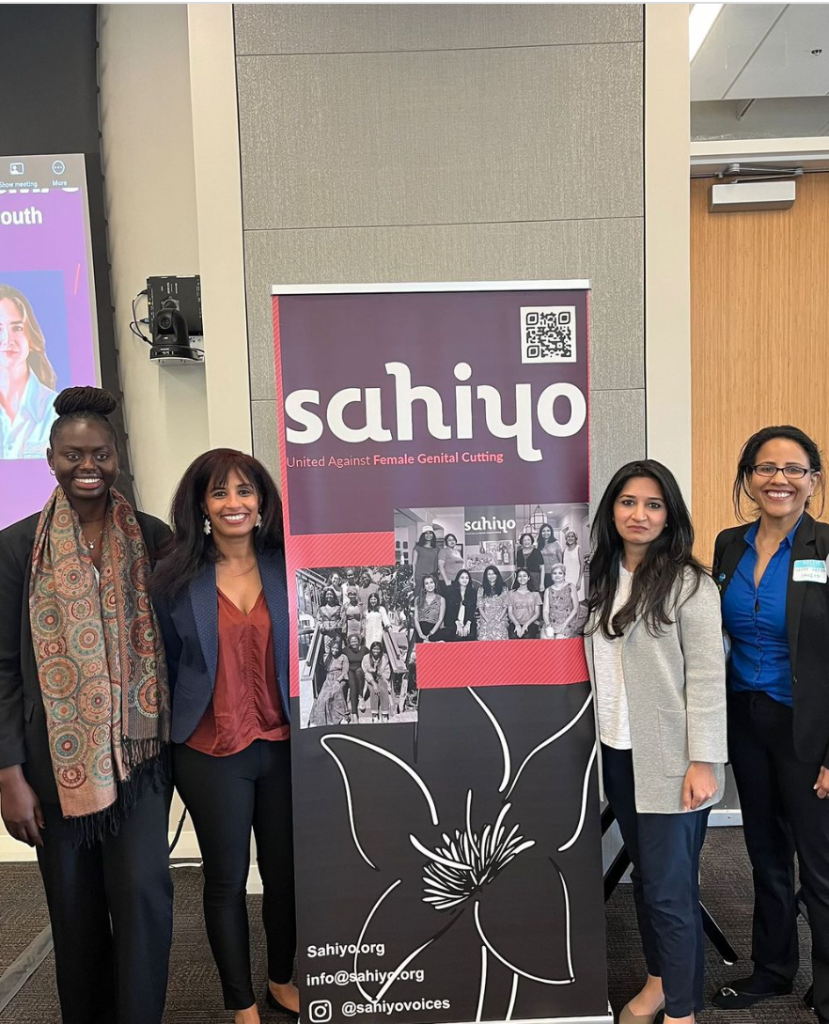
By Samman Masud Sahiyo U.S. Executive Director Mariya Taher attended the Global Collaboration to End FGM/C Conference in Washington D.C, a two-day event that brought together key stakeholders committed to ending female genital cutting worldwide from October 28-29, along with Community Engagement Coordinator Samman Masud as well as Advisory Board Members Nesha Abiraj and Absa Samba. Held at The George Washington Milken Institute School of Public Health, this gathering included participants from the international community and a diverse group of experts, including philanthropists, global regional FGM/C networks, U.S. government entities, civil society organizations and activists that work together to end FGM/C. The conference, which began with a networking event followed by intimate fireside chats and conversations with these partners sought to address a key challenge to progress in global FGM/C advocacy: the funding gap and significant lack of resources allocated to prevent and respond to violence against women, particularly FGM/C. Psychotherapist and Global Advocacy Director for The Girl Generation, Dr. Leyla Hussain, led the opening remarks. Dr. Wisal Ahmed, the Global Coordinator for the UNFPA-UNICEF Joint Programme on the Elimination of FGM, Susan Gibbs – Senior Advisor on Women’s Rights & FGM at Wallace Global Fund – and Dr. Kakenya Ntaiya – founder of Kakenya’s Dream – also welcomed attendees with speeches that recognized FGM/C as a pressing gender-based violence issue. They also portrayed it as an alarming public health crisis, bringing with it intersecting problems of child-marriage, human trafficking, and rising mortality rates between women and girls around the globe. A panel discussion moderated by Sahiyo’s Mariya Taher titled, “Current Global Efforts to End FGM/C”, included representatives from Asian, African, European, and the U.S. and Canadian regional networks, where participants discussed issues related to anti-FGM/C advocacy that were prevalent and specific to their communities. Conference attendees also watched a private screening of the short film, “The Beginning”, directed by Sahiyo Co-Founder Insia Dariwala. The film captures a mother’s trauma as a survivor of FGM/C, and her mission to stop family members from performing the same ritual on her daughter. The fireside chats with philanthropists and civil society organizations were well received, with engaging conversations about barriers that halt progress in anti-FGM/C efforts on a global scale. In a concluding but critical closing session, all conference attendees participated in a group activity to further build out recommendations initially discussed at Women Deliver 2024 in Kigali, Rwanda, on specifically funding grassroots FGM/C movements and organizations. Participants collaborated to brainstorm best practices for grantmaking in the sector that are inclusive and adaptable to the realities on the ground for activists and organizers. These recurring conversations involved the importance of long-term and sustainable funding to address FGM/C, and to drive policy changes and community-based solutions for survivors and at-risk communities.
Voices to End FGM/C 2024 Cohort Video Screening
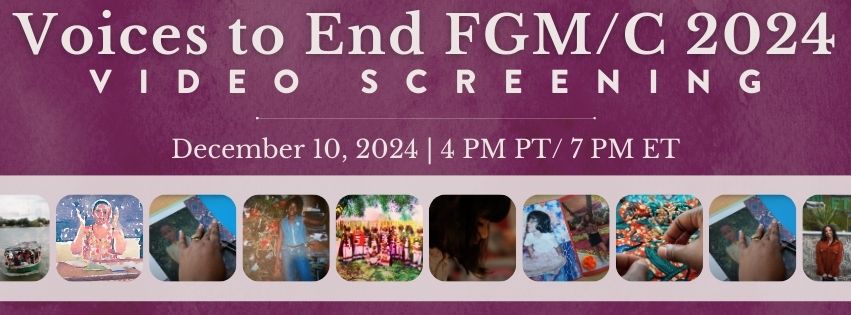
Date: December 10, 2024 Time: 4-5:30 PM PT/7-8:30 PM ET Registration link: https://bit.ly/RegisterVoices24Screening On Tuesday, December 10th at 4-5:30 PM P.T./7-8:30 PM E.T., Sahiyo – in partnership with Asian Women’s Shelter and Silence Speaks – will host a screening of the newest set of Voices to End FGM/C digital stories, created by survivors of and advocates working to end female genital mutilation/cutting (FGM/C). In addition to viewing these 10 new poignant stories, attendees will hear from some of the storytellers themselves about their experiences in the storytelling workshop and their work to end FGM/C. “It’s like we created our own community as we held space for one another while bearing witness to each other’s stories as they were told. I also appreciated and valued the accommodations made to ensure that all participants had the best possible experience. It’s things like this that made the workshop a special and meaningful space to be a part of. ” – Musu Bakoto Sawo, Voices ‘24 Workshop Participant The Voices to End FGM/C program is a digital storytelling project created by Silence Speaks and Sahiyo that aims to mobilize a critical mass of survivors and activists from across the globe. Voices to END FGM/C brings people together to share and heal from their experiences of FGM/C, to connect and grow as leaders in their own communities, and to create short videos calling for an end to this harmful practice. If you are interested in hosting a screening showcasing digital stories from Voices to End FGM/C with your own organization, with classmates, or with co-workers, check our new Voices to End FGM/C Screening Guide! This is an in-depth resource with discussion questions, FAQs, and event planning templates. For any questions related to this guide or our Voices program, please email aries@sahiyo.org.
